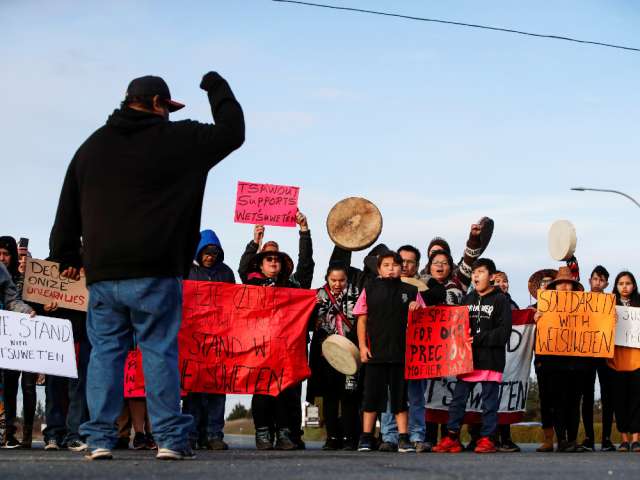From Financial Post
“I think the NGOs, the protestors and the Mohawks can stand down. The Wet’suwet’en people got this,” Karen Ogen-Toews said Sunday
CALGARY – After weeks of protests and blockades that led to three days of face-to-face meetings, an agreement between the federal government, British Columbia and hereditary Wet’suwet’en chiefs has been struck to potentially end the pipeline dispute.
Indigenous Relations Minister Carolyn Bennett and B.C.’s Indigenous Relations Minister Scott Fraser said Sunday that a tentative deal has been reached with hereditary chiefs opposed to the $6.6-billion Coastal GasLink pipeline.
“We, I believe, have come to a proposed arrangement that will also honour the protocols of the Wet’suwet’en people and clans,” Bennett said after three days of meetings in Smithers, B.C.
“What we’ve worked on this weekend needs to go back to those clans and then we have agreed as ministers that we will come back to sign it if its is agreed upon by the Nation,” she said.
The agreement represents an unexpected milestone in the dispute after a previous round of talks last month failed to resolve the disagreement in northern B.C. that has since spread across the country in the form of rail blockades.
Sunday’s agreement is expected to establish a protocol to deal with contentious projects such as the Coastal GasLink pipeline in the future.
“We are going to be continuing to look at some more conversations with B.C. and of course with the proponent and further conversation with the RCMP out on the territory,” said Chief Woos, one of the hereditary leaders.
But the Wet’suwet’en community is divided after the hereditary chiefs opposed to the pipeline attracted national attention and sparked a wave of solidarity protests across the country that included rail, highway and port blockades, said Wet’suwet’en First Nation councillor Karen Ogen-Toews, who is also the CEO of the First Nations LNG Alliance.
“I think the NGOs, the protestors and the Mohawks can stand down. The Wet’suwet’en people got this,” Ogen-Toews said in an interview Sunday.
She said the agreement reached over the weekend needs to be ratified “by all of the Wet’suwet’en people.” She said the onus is now on the hereditary chiefs to ensure they reach out inclusively to all Wet’suwet’en councils and people about the agreement.
“I think it could be positive all the way around,” Ogen-Toews said.
She said that elected band councils — all of which have signed agreements with Coastal GasLink — are responsible for providing housing and other supports for Nation’s members and an LNG industry represents an opportunity to better provide for the people.
“It’s always about making sure that our people are taken care of and our land is taken care of. I can’t emphasize that enough,” she said.
With the agreement reached Sunday, the company building the pipeline across northern B.C. said it is preparing to resume work on the project after a four-day pause while Bennett, Fraser and the hereditary chiefs held meetings.
“Coastal GasLink appreciates the dialogue that has occurred over the past several days and the fact that significant progress has been made to address the concerns of the Wet’suwet’en Hereditary Chiefs,” Coastal GasLink president David Pfeiffer said in a release Sunday.
“While much has been accomplished, much work remains and we wish all parties success as their work continues and the Wet’suwet’en people consider the proposed arrangement,” Pfeiffer said.
There are currently 1,200 people working on the pipeline through northern B.C., 30 per cent of whom are Indigenous, according to the company.
Over the course of February, the federal government and B.C. government attempted to meet with the hereditary chiefs on multiple occasions. In early February, a round of talks ended without an agreement, which led to the B.C. RCMP enforcing an injunction and arresting protestors along the pipeline route.
The arrests sparked solidarity protests across the country that have snarled railways traffic and inhibited ports in Eastern Canada from handling both import and export cargoes.
Ellis Ross, MLA in the region and former chief councillor of the Haisla Nation, said the female elders in the Wet’suwet’en community deserved credit for demanding to be part of the consultations between the hereditary chiefs, Bennett and Fraser.
“Canada has actually been saved by the matriarchs of the Wet’suwet’en Nation,” Ross said in an interview, praising the elders’ courage.
“I think what they did was force everyone to acknowledge that Wet’suwet’en members deserve to be heard as well,” Ross said.
He added that establishing protocols for consulting on major resource projects with the community is “extremely difficult.”
“You’re trying to go on the basis of (Aboriginal) rights and title case law. At the same time, you’re trying to keep your community apprised the whole time,” he said.






